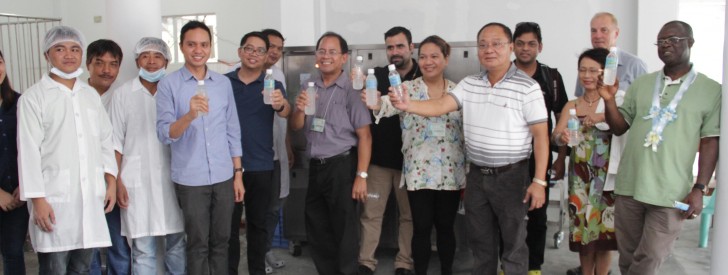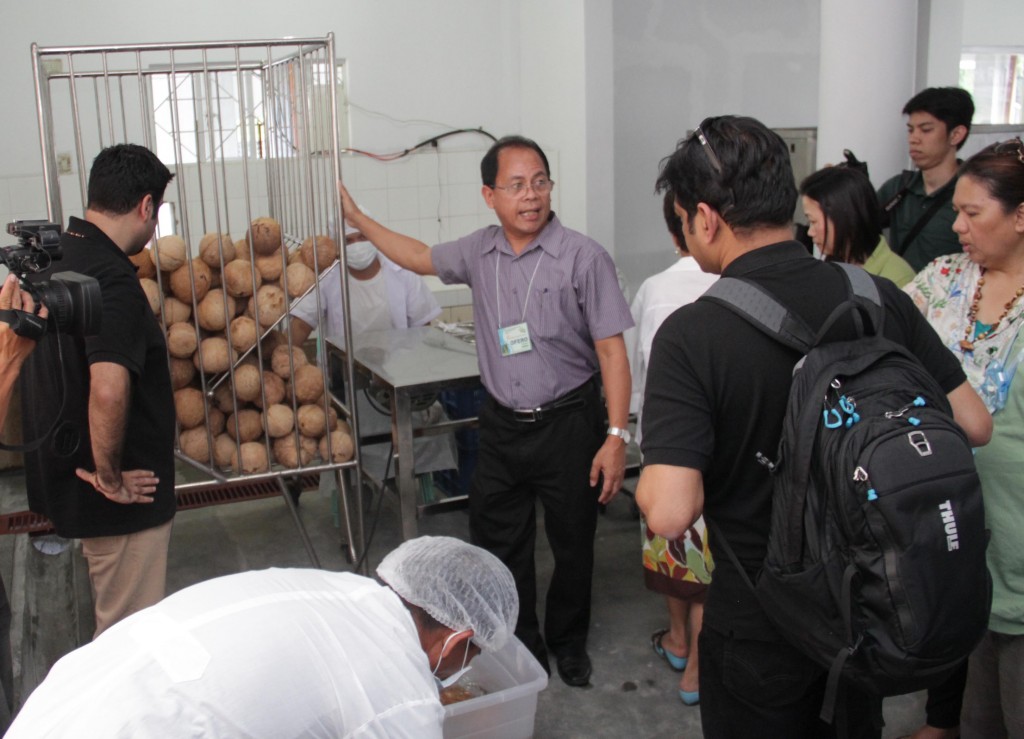 PSO Luzon B Project Director Shandy M. Hubilla, PRDP Deputy Project Director Engr. Arnel V. De Mesa, PhilMech Chief Science Research Specialist and Division Chief Dr. Ofero A. Capariño, PRDP Task Team Leader Carolina V. Figueroa-Geron, DA-RFO V Regional Executive Director Abelardo R. Bragas, and the WB team endorse the PINOY Coco water, produced at the village level coconut water processing facility.
PSO Luzon B Project Director Shandy M. Hubilla, PRDP Deputy Project Director Engr. Arnel V. De Mesa, PhilMech Chief Science Research Specialist and Division Chief Dr. Ofero A. Capariño, PRDP Task Team Leader Carolina V. Figueroa-Geron, DA-RFO V Regional Executive Director Abelardo R. Bragas, and the WB team endorse the PINOY Coco water, produced at the village level coconut water processing facility. World Bank officials: Coco water project a very good achievement
February 11, 2015
SAN AGUSTIN, PILI, CAMARINES SUR –World Bank technical experts, headed by Carolina V. Figueroa-Geron, visited the Coco Water Processing Technology Pilot Testing and Business Incubation Facility at the DA Regional Technology Commercialization Center, Bicol Integrated Agricultural Research Center (DA-RTCC BIARC) in San Agustin Pili, Camarines Sur as part of the 1st World Bank Supervision Mission to South Luzon (Luzon B) Cluster on February 3, 2015 shortly after their site visit and consultation at Brgy. Cuco in Pasacao, Camarines Sur.
Geron expressed her appreciation of the Coco Water Processing Technology Pilot Testing and Business Incubation Project which will pilot test the technology developed by the Philippine Center for Postharvest Development and Mechanization (PhilMech).
“You’re doing the right thing and you have the sources to do that under the project. That’s very good and I hope that you will think of other commodities as well as innovations and product design. That’s a very good achievement you’ve already done under the sub-component 3.2 of the I-REAP component right at the start of the program,” Geron said.
PhilMech Chief Science Research Specialist and Division Chief Dr. Ofero A. Capariño briefly discussed the project background, description, and objectives of the Coco Water Processing Technology Pilot-Testing and Business Incubation Project. He then explained the process flow in the production of coconut products and demonstrated the Village Level Coconut Water Processing System Process Flow through a tour to the Village Level Coconut Water Processing Center. Moreover, free samples of processed PINOY Coconut Water were distributed to the WB officials and other guests.
The P6,560,000-worth Coco Water Processing Technology Pilot-Testing and Business Incubation Project is a partnership among the DA-PRDP, PhilMech, DA-RFO V, Camarines Sur Provincial Local Government Unit (PLGU), and Central Bicol State University of Agriculture (CBSUA). For one year, coco water’s market acceptability, profitability, product characteristics, and machine efficiency will be pilot tested prior to full commercial adoption. The project also aims to establish product and machine protocols as well as engage and train farmer groups as suppliers of raw materials and eventual operators of the coco water processing facility.
The village level coconut water processing facility was developed by PhilMech Science City of Muñoz, Nueva Ecija. It has a capacity to process around 2,000 mature coconuts into 600 liters of coco water daily. Meanwhile, PRDP will provide support to develop priority commodity value chains and products like coco water which was identified by the DA RFO V and Camarines Sur PLGU as one of the project’s priority under its Investments in Rural Enterprises and Agriculture and Fisheries Productivity (I-REAP) component.
DA Secretary Proceso J. Alcala led the blessing and inauguration of the facility on February 11, 2015 (with separate report). (Annielyn L. Baleza, I-SUPPORT InfoACE Unit, DA-RAFIS 5)

